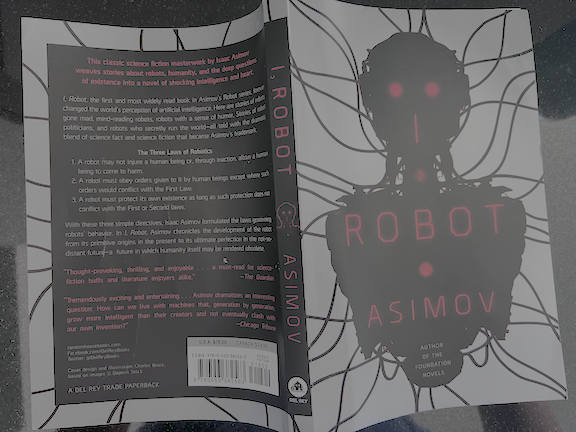It is possible I read this over five decades ago, but if so, I don’t recall any of the stories. I know I read some ‘three laws’ stories, but that may have been in some other book/collection, possibly Caves of Steel. I read this because it was a pick for Elle Cordova’s SF Book Club, even though this one was picked and discussed before I joined. But, I was curious as to how I’d experience this very old story (circa 1950), and probably a little motivated by the ‘collect-the-whole-set’ phenomenon, as I picked up the book club on its second book.
Though I don’t remember any of these stories in particular, Asimov’s three-laws stories are sort of a one-trick pony: there is some kind of mystery or inexplicable event involving a robot, and the resolution turns on realizing that the three laws are not being interpreted or executed as intended, and thus the problem is that the robots are being too literal. Thus, in one story, a robot lies to various humans in the story because it is telepathic and knows what they want to hear, and so it can’t tell them the truth because that would ‘harm’ them. So, they are all essentially puzzle-stories.
Asimov’s characters are not terribly well developed. It feels as though he has carefully chosen a stereotype for each, and few physical or behavioral features of each character as a synecdote for their individuality. We’ve got the hot-headed, angry red-headed Irish engineer, and his cool and more reflective partner. And of course, Susan Calvin, the brilliant but plain woman who has repressed everything but her mind to make it in the world of science. But kudos to Asimov for creating a central female character in the 1950’s, and making her as well developed (which is to say, not very) as any of the male characters.
If these stories are from the golden age of science fiction, they are also from the golden age of smoking — it is astonishing, to 21’st century eyes, to see how many people smoke, even on space ships. It is also interesting — and characteristic of the time of writing — to find that unions have played a significant role in keeping robots off of earth and out of the workforce, as have religious movements.
I wondered reading these stories would whet my appetite for more of Asimov’s robot books, but the answer is no. Although, it could be interesting to read some of the other books where more modern writers — David Brin being one — filled in some of the gaps in Asimov’s world.
# # #
Views: 0
